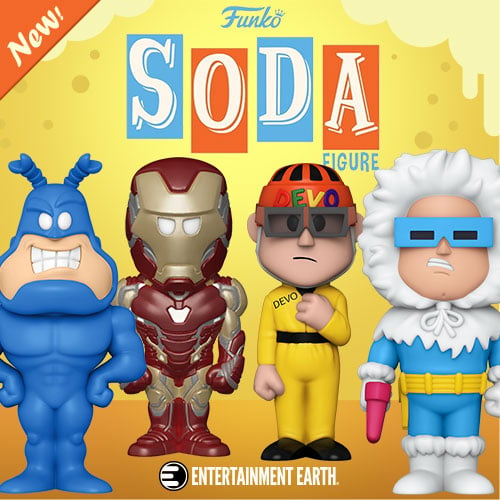USA Network’s newest hit show Colony comes from the brilliant minds of 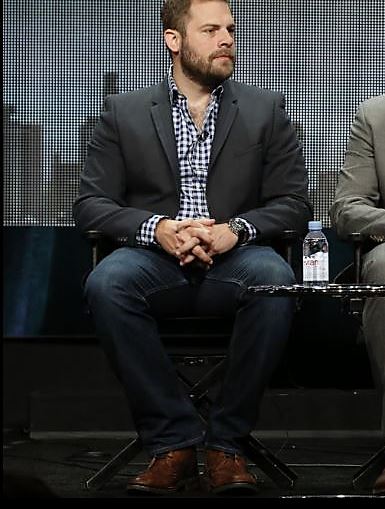 Carlton Cuse and Ryan Condal. Colony tells the story of a world in which Los Angeles has been invaded and occupied. The remaining residents live under military rule trapped behind a 300ft wall. This gripping show was greenlit for a second season after 3 episodes
Carlton Cuse and Ryan Condal. Colony tells the story of a world in which Los Angeles has been invaded and occupied. The remaining residents live under military rule trapped behind a 300ft wall. This gripping show was greenlit for a second season after 3 episodes
Last week we had the opportunity to join in a roundtable interview with Executive Producer/Creator Ryan Condal.
Operator: Ladies and gentlemen, thank you for standing by. Welcome to the USA Networks conference call about the new series Colony with creator Ryan Condal.
As a reminder this conference is being recorded Wednesday February 10, 2016 I would now like to turn the conference over to Leah Sparkes. Please go ahead.
Leah Sparkes: Hi everyone and thanks for participating in this conference call. We are very happy to have Ryan Condal, the Co-creator and Executive Producer of USA Networks’ drama series, Colony. He’s the creator along with multiple award winning writer and producer, Carlton Cuse. And Ryan was named one of Variety’s Ten Scribes to Watch.
We’re happy to have this conference call pegged to Episode 105, airing tomorrow and on the heels of our second season renewal announcement. So I will now turn it over to the first question.
Our first question comes from the line of Tanya Gonzales with Talk Nerdy with Us. Please go ahead.
Tanya Gonzales: Hello, this is Tanya Gonzales. And my question is how did you come to this decision to start the series after the arrival had occurred? And what changes and creative opportunities have resulted from that decision?
Ryan Condal: Hi, Tanya. Thanks for the question. You know, Carlton and I are genre-heads, and I think when we were, you know, initially talking about the theories, we were really fascinated with this idea of trying to reinvent or at least present a new look into the sub-genre, the sub-sci-fi genre of alien invasion. And there have been alien invasion stories told across every platform of television, film, literature since War of the Worlds, and we really felt like in order to be a new entry, you had to have something new to say or at least a new way into it.
And we became really fascinated with this idea of telling the story after we lost, because most of these stories deal with, you know, the war or the invasion itself, and we were really fascinated with the idea of telling the after.
And that came out of a love for history, and when, you know, I initially, you know, brought the idea over to Carlton, you know, it was really inspired by this idea of the Nazi occupation of France and of Europe, and the stories that came out of this world where you were living and you were home in your city but suddenly it had changed and had become this dangerous place where the rules were different.
But in order to tell the story from that perspective, the sort of the war already had to be lost, and we thought it was just a great ground, you know, platform for storytelling that had a really long runway ahead of it. So there are, you know, there are many, many seasons of material in front of us because we’re dealing with this kind of open ended situation that makes it really perfect for television.
Tanya Gonzales: Yes, it does. May I ask you another question?
Ryan Condal: Sure, go ahead.
Tanya Gonzales: When you and Carlton choose the designing the world and society of colonies, what did you draw from for inspiration?
Ryan Condal: You know, a lot of history, you know, as I mentioned. I mean, we’re both big students of history. And Juan Campanella, who was our director on the pilot and in the first two-episode series, grew up in Argentina during the dictatorship in the 70s and he had this really – he had lived through something like this. And he had this really kind of visceral, clear perspective on it. And he brought a lot to the design. He had a design of the world on the pilot.
But the point is, we all wanted to make it feel very real and present. And whereas in most dystopian stories, like in Blade Runner and in The Walking Dead and in even something like Children of Men, the world always feels very upended. And we’re really intrigued by this idea of the 90/10 role, which is that 90% of the world looks exactly as it was, and the 10% is wildly different.
So, you walk out into the streets of LA and you see, you know, sunny skies and palm trees and most of the buildings are intact and then you start to notice there are no cars on the road. There are 300-foot walls surrounding the city and there are drones crisscrossing the skies. It’s that 10% that’s very recognizable that really unsettles you and sets you off and makes it feel like you’re living in a real environment where something really radical has happened.
Operator: Thank you. Our next question comes from the line of Courtney Vaudreuil with OhSoGray. Please go ahead.
Courtney Vaudreuil: Hi. In each of the episodes so far, we discover that no character is who he or she seems to be. Is that part of your goal with this, to maintain a feeling of instability and unpredictability? And will there ever be a moment of clarity later where we see how everyone fits together?
Ryan Condal: Hi, Courtney. Thank you for the question. Yes, I think this is the condition created by the fog of this war, or this invasion. And unfortunately, because of this situation, everybody in Los Angeles in some way or another has had to really reinvent themselves.
Whether it’s something as simple as an FBI agent working in a state run garage to put fuel cells into the cars of the wealthy and privileged members of the green zone, or it’s something like, you know, a wife and a bar owner suddenly becoming a lieutenant in this resistance or against the occupation, it’s the story of instability in a government, in this city where the roles have been upended and it causes everybody to suddenly have to become somebody new — either by choice or not by choice.
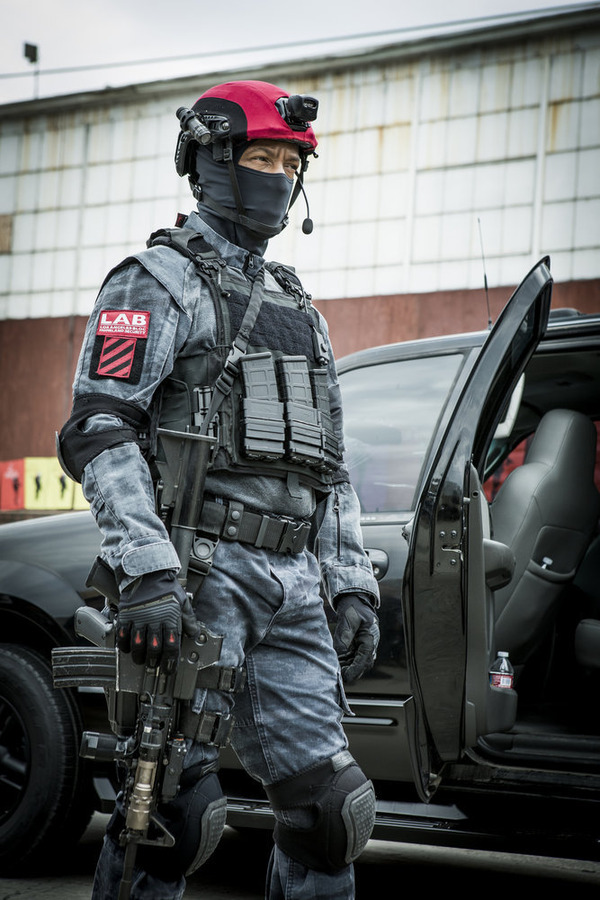
COLONY — “Yoknapatawpha” Episode 106 — Pictured: Redhat — (Photo by: Isabella Vosmikova/USA Network)
This happened all over Nazi-occupied Europe and when the Soviet empire was at its height, it just forced people to have secrets and to really keep close to the vest truths about them and play a different role depending on what situation they were in. And I mean, that’s the rich pool of drama that we’re really interested in drawing from.
And it inspired us. It inspired the series and all the characters. And I think the, you know, good news is for fans who are watching and paying attention is that, you know, we do have a lot of these mysteries and backgrounds already worked out and we’re waiting to unveil them, you know, when the time is right. So I think fans who keep watching and stay loyal to the series will be rewarded as the show evolves.
Operator: Thank you. Our next question comes from the line of Kara Howland from TV Goodness. Please go ahead.
Kara Howland: Hi, Ryan. So I have to say I was a little bit shocked — well, a lot shocked — when Phyllis was killed in last week’s episode. And like everyone else, you know, you just mentioned she has secrets. When are we going to find out more about her?
And I did see the preview, one of the clips from tonight. And it looks like Will is now head of the union – I mean unit. How is that going to affect things?
Ryan Condal: Well, yes so Phyllis – I love the response on Phyllis. I mean, Kathy Baker was such a huge get when we cast her, and we had always planned to introduce this character in episode two and then kill her off early in the season as a way to show the brutality and the reach of the resistance, and also to show that you know, nobody in this world is safe so don’t get too attached to anybody.
But yes, Phyllis is a fascinating character. I mean, I think the thing that people are really responding to with her is the fact that she did have a practical point of view on things. And she wasn’t – she’s running this counter-resistance unit and will do kind of brutal, inhumane things in order to reach her goals, But her goals are to — at least from her perspective — to keep the block safe, or as safe as it can be, and to minimize the unnecessary loss of human life.
Seeing the big game, which is at the end of this, the resistance is somehow effective, there are these very powerful – this very powerful occupying force could lay waste to the city or it could kill a lot more people than the transitional authority is even harming day-to-day.
I think people really responded to that and, you know, I think part of the fun of her, the mystery of who she is and her background is one of those things that it’s just, you know, that’s life. It’s not always going to be fully and completely explained but it still is clearly with a very experienced character actor in this world of spies and espionage. And, you know, as Snyder says to Will in the first episode, a rare breed these days. I mean, a lot of these people were taken out or eliminated.
So I think a little bit more will be filled out about Phyllis but I think a lot of her will be left to be debated about.
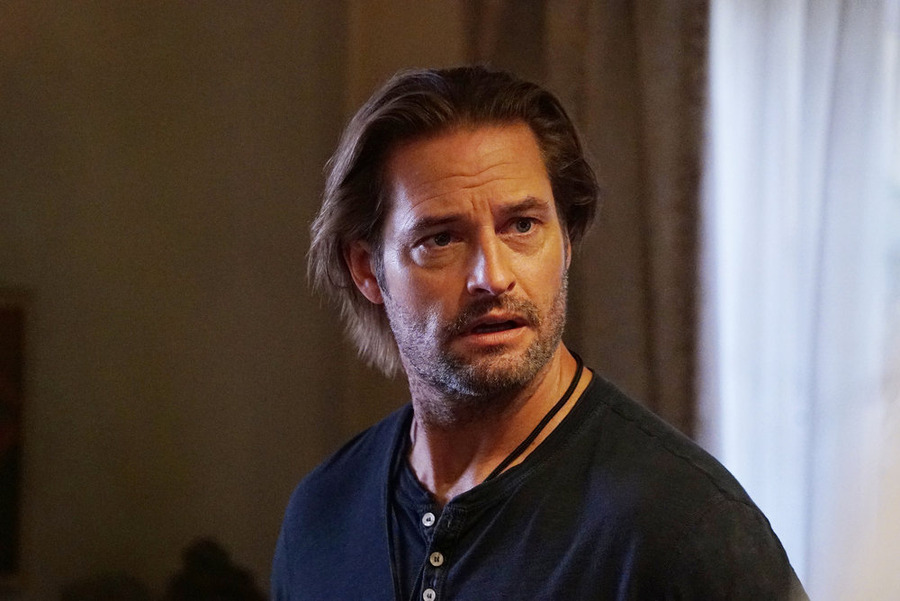
COLONY — “Blindspot” Episode 104 — Pictured: Josh Holloway as Will Bowman — (Photo by: Danny Feld/USA Network)
Operator: Thank you. Our next question comes from the line of Michael Simpson with SciFiNow. Please go ahead.
Michael Simpson: Hi, Ryan. Thanks for coming on. I appreciate your time.
Ryan Condal: Hi, Michael. Thanks.
Michael Simpson: So, a question then. You kind of touched on this already. Was it a conscious decision to sort of keep the sci-fi element of the show low key?
Ryan Condal: Yes, very conscious. You know, I think it’s one of the big reasons that when we were speaking with NBC Universal, the larger, sort of earlier conversations that Colony landed at USA versus the Syfy Channel. I mean, I think there’s a lot of really awesome programming on over there. The tradition sort of started by Battlestar Galatica — one of my favorite TV shows. But the sci-fi shows that are on Syfy now are much more kind of hard sci-fi.
The things that, you know, really appeal to me as a fan but aren’t necessarily the kind of shows that grab audiences that don’t have a predisposition towards sci-fi. And we really wanted Colony to appeal to a broad audience that was interested in some element to the show. So there’s going to be an element that’s drawn to the core family dynamic of the show that sees this as a drama set in a wartime place. There’s going to be an audience that’s drawn to the espionage elements of the show. One of the great shows on TV now, The Americans, that element of this husband and wife in a world of secrets and lies. And you know, we have sort of jokingly called the show the first spy-fi show and we like that.
And then I think there’s the under layer of science fiction, which is, you know, Carlton and I are huge sci-fi fans ourselves and have loved sci-fi all of our lives. And one of the things that we were really inspired by was taking this kind of allegory for an occupied world and putting it into a modern science fiction context and then playing with all of the mysteries that come out of that.
So, you know, it was very intentional and I’m glad that people seem to be responding to it. You know, the nice thing is that people – I think sci-fi is less now than it was 10-15 years ago — and in a good way — but the term can be a pejorative and we like that, with Colony, that it adds to the puzzle instead of having to be this, you know, kind of barrier that people have to get past in order to become engaged with the show.
Operator: Thank you. Our next question comes from the line of Erin Conrad with ThreeIfBySpace. Please go ahead.
Erin Conrad: Hi, Ryan.
Ryan Condal: Hi, Erin.
Erin Conrad: I wanted to ask you – hi. I wanted to ask you about your interpretation of the motivations of the groups of people you have put in place. The people at the top, do you see their motivation as more they understand the futility of trying to defend themselves against an overwhelming force? Or do you see it more as the baser nature of taking advantage of gee, I’m not going to die and I could come out of this better than I was before?
Ryan Condal: I think that’s a great question. And, you know, the nice thing about complex, long-form storytelling is that there is no one answer to that. I think, you know, one of the things that is a quality of a lot of these kind of alien invasion stories, because of the nature of the medium in which they’re told — which is usually film — is this idea of this kind of hive mind and it’s like it’s, you know, the black hats against the white hats. And the black hats are often the aliens and the white hats are often the humans trying to survive.
And we wanted to really create a complex world of gray where on either side of the conflict there are people that have made their choices for selfish, self-serving reasons and there are people that have made choices to try to survive, to protect their own family, to be able to get ahead, to get the things that they couldn’t have in the world as it existed before and now they can with this new opportunity. And I think you will see that through the ranks of both the resistance and the occupation, and just the day-to-day survivors of Los Angeles across the show. And I mean, that’s the milieu that we really wanted to create.
Erin Conrad: Thank you.
Ryan Condal: Of course.
Operator: Our next question comes from the line of James Hamilton with Geekstronomy. Please go ahead.
James Hamilton: Hello, Ryan. Thanks for speaking to us today.
Ryan Condal: Hi, James. Thanks.
James Hamilton: My question is – well actually I want to start with saying the show is extremely fast paced. More happens in the first three episodes than season two of The Walking Dead. And I really like that.
So I’m curious, they keep mentioning that this is a transitional government. What is it going to transition into? And when do we find out?
Ryan Condal: That’s a lot like alternative music, and you know, alternative to what? I think both of those questions are left sort of intentionally open ended and interpretable. And, you know, we were really – I will say this you know, the show is very fast-paced.
I mean, we live in a world where there are 411, 412 or whatever it was scripted television shows on in the last 12 months in the United States alone. So, it’s hard to grab eyeballs, I mean really especially with a show that doesn’t have any preexisting IP. I mean, we have the great, you know, reunion of Carlton and Josh going for us, which is great but other than that, it was just something entirely created new for television.
And really, you want to draw viewers discerning very, you know, often picky and taste driven viewers that have a lot of choices into a world that will grab them and hold them immediately and I think we’ve been successful with that and we’re proud of that and part of that is they’re kind of dropped into the second act of the story that’s already moving and they’re asked to participate with us to catch up, which we like and we’re very proud of.
And, you know, I’m sorry, what the second part of your question was?
James Hamilton: I’m sorry. You broke up a little bit at the end. I’m sorry.
Ryan Condal: I’m sorry. The second part of your question?
James Hamilton: Yes. I wanted to know how soon before we find out what it’s going to transition into.
Ryan Condal: Yes. So, we were very fascinated with — Carlton and I — with this current culture of language and how things are presented to people. And, you know, there’s a lot of play. If you watch the show and continue to watch — which we all hope you will do — depending on what side of the conflict you’re on, things are termed differently.
So if you’re on the red side of the conflict — on the side of the occupation — you don’t refer to yourselves as the occupation. You refer to yourselves as the transitional authority. And you don’t call the police force the red hats. You call them homeland security. And you don’t call the resistance the resistance, because that empowers them. You call them the insurgency or the terrorists, right?
James Hamilton: Right.
Ryan Condal: And then on the other side of the equation, there is the occupation and we are the resistance and those are the red hats. And we were fascinated with this idea that at some point in this formation of the human proxy government, there was some kind of meeting between, you know, marketing and branding minds where they tried to select terms and phrases to make the occupation a little bit more palatable to the people.
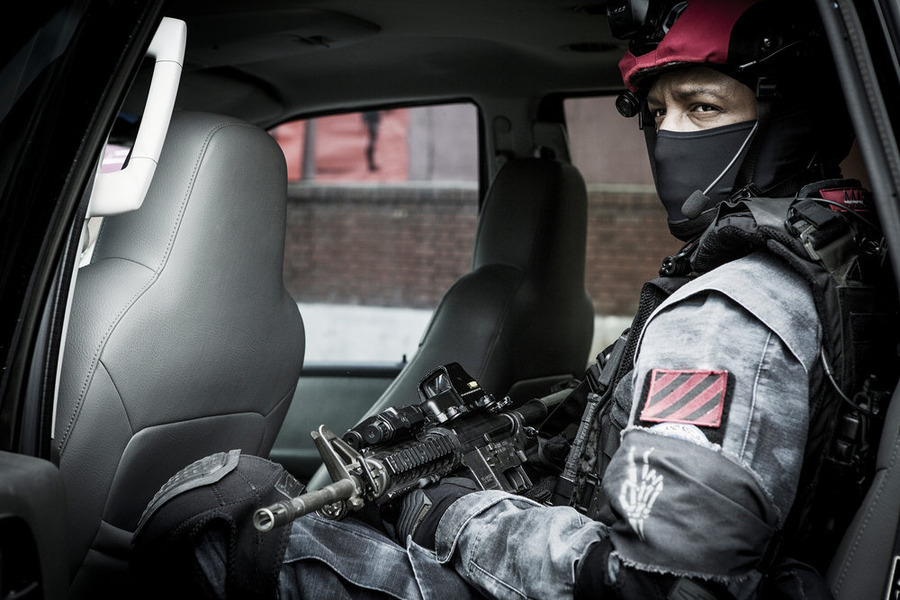
COLONY — “Yoknapatawpha” Episode 106 — Pictured: Redhat — (Photo by: Isabella Vosmikova/USA Network)
So I think you’ll notice a lot of terms in the show that are used — like green zone, for instance — that are pulled from preexisting current events and things that would’ve existed in this world before the occupation happened to try to make people feel like they are, you know, that things haven’t changed all that much and that there is this kind of familiarity about everything. And I think that layered in that is some sort of insidiousness and sinisterness that, you know, is just part of the show that we’re trying to create.
James Hamilton: Thank you. I have one other very quick question.
Ryan Condal: Great.
James Hamilton: Your background is in accounting and economics. How did you get into sci-fi writing?
Ryan Condal: Yes. I have a sort of weird background. Look, the answer is I’ve always been, you know, I think I was one of those weird kids that always wanted to be a writer. And I envisioned myself as a, you know, when I was 12 and I was trying to read Tolkien for the first time, as one of these authors in front of a typewriter with a tweed jacket with a pipe. It’s just always something that I wanted to do. I’ve just always been obsessed with and drawn to storytelling kind of in all of its forms.
But when you grow up in suburban New Jersey to a schoolteacher mother and a software engineer father, you grow up in a very practical household. And when they’re about to graciously pay for you to go to a very expensive university like Villanova, they also expect you to get a real degree while you’re there. And I don’t think that getting a literature or a film degree at the time would’ve been very appealing to them in the mid-90s. So I chose business because I knew I needed to go and get a real job so I could get, you know, go out and earn a living when I got out of school and work on my screenplays in the intervening times. And I sort of just stumbled my way into accounting, which is probably the antithesis of the writer. Actually the only thing those two professions share is the desire to sit alone at a desk and not talk to anybody all day.
So, I think you can tell that there’s some similarity there and that’s probably where the Venn diagram crosses over. But other than that, they could not be a more different pursuit.
Our next question comes from the line of Simon Applebaum with Tomorrow Will Be Televised. Please go ahead.
Simon Applebaum: Yes, thank you very much. And a quick disclosure everybody — Ryan is going to be on our show on blog talk radio this Friday at 3:00 Eastern. Noon on the west coast.
Ryan, you mentioned The Americans before, and one of the key elements of that show is how the parents being spies have an impact on the rest of their family. And of course, the family dynamic is essential to your theories. When will we hear more or see more about how the relationship that the parents have on the kids?
Ryan Condal: I think, you know, you’ll see a lot more of that in the coming episodes — even beginning, you know, tomorrow night on, you know, with episode five.
You know, at its core, Colony started as a family drama. I mean, we really wanted to tell the story of this occupation from the point of the view of one family that, you know, although this is an extraordinary family in the sense that they find themselves on opposite sides of the occupation and they have this, you know, kind of mysterious and hidden backgrounds about, you know, them — with Will with his military and law enforcement experience.
I mean, other than that this is a typical family in Los Angeles, and we wanted to tell the story through their eyes of what it’s like to live in this occupied world. So their kids and how, you know, their kids react to all of that is an important part of it. And, you know, Charlie, their middle child — the one who’s missing — is kind of what catalyzed this whole story and what set it. And in the early part of the pilot, Will desperately needs to get reunited with him.
So as broad as the show will get in terms of the storytelling and seeing different corners of this world and the universe and all the different ideologies and loyalties that are involved with it, it does always come back to the Bowman family and their kids and, you know, Isabella and Alex, who plays Bram, are terrific actors. We got a lot of great work out of them and I think you’ll continue to see that through the last six episodes.
Simon Applebaum: The other question, Ryan, is you’re the latest example of this (unintelligible) scripted television where we’re seeing first time people who have never done television, where they come from — in your case, advertising and doing film, – – the
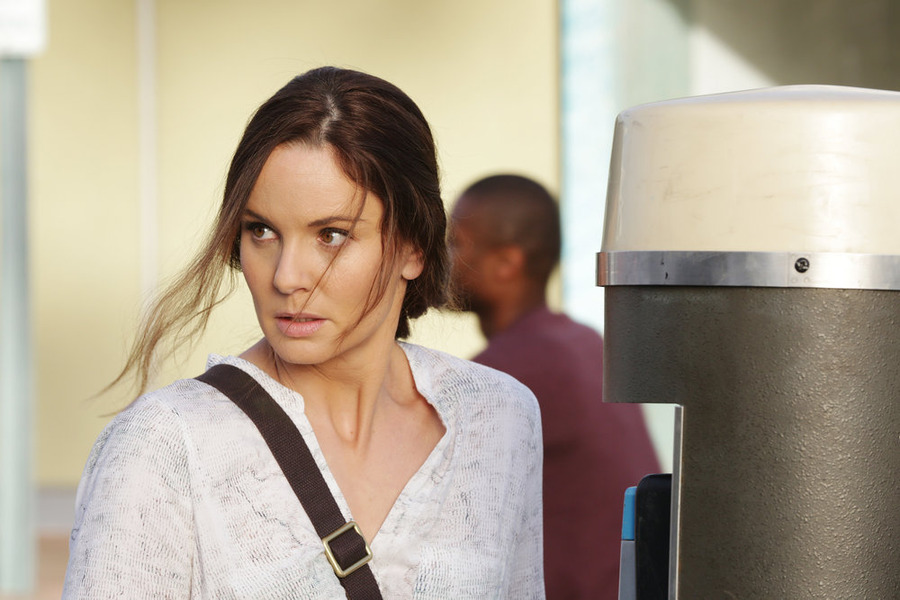
COLONY — “Pilot” Episode 101 — Pictured: Sarah Wayne Callies as Katie Bowman — (Photo by: Chris Haston/USA Network)
script for Hercules – whether it’s been people doing plays, people doing independent movies or major feature films, getting involved not just in creating television shows, but running television shows.
What’s it been like to be the show runner and what kind of impact has Colony had on the way you do it?
Ryan Condal: Well, it’s you know, it’s an incredibly – I’m very fortunate to have the experience. It’s terrifying at times, I will tell you — less so now I’ve done it once. But, you know, when I got – when season one got picked up and I got dropped into the room, it was not only the first time I’d ever been a show runner. It was the first time I’d ever been in a writer’s room. And to immediately make the transition from not just being there but to running it, it’s kind of crazy.
But, you know, first and foremost you’re a storyteller and I think that’s something that doesn’t really change, regardless of what role you’re in, whether you’re the staff writer or you’re the executive producer reporting to the showrunner, or you’re the showrunner him or herself, I think you’re a storyteller.
And, you know, the benefit that I had in this situation is not only having a show that started as a pilot that we had talked about I think for almost a year and a half before we even got into the writer’s room on season one — just because of the nature of the development of this thing — we had a very clear perspective on what the show was. And I had a clear perspective of what the show was and what it wanted to be and what it was going to be. So I had the confidence to go in and say look, I know the show that I want to make. And I think that’s really the first and primary hurdle for all showrunners and all creators is just if you know what the show is, then you can lead that charge. And a lot of shows unfortunately I think just because of the way this crazy competitive environment don’t have that. So I think we were very fortunate to have that going into Colony.
And, you know, the other thing I was fortunate to have was Mr. Cuse who has not only been a tremendous mentor and partner for me for going on three and a half years now, because we started working together in the summer of 2012 when I was brought into meet with him to write the script for The Sixth Gun which was another show that he was executive producing at the time for NBC and was based on a comic book — much different show.
But that’s how we met, and then we made that pilot and the pilot didn’t work out with NBC but we had this really good working relationship where we really inspired by each other creatively. And that all sort of led to Colony happening.
So I’ve been, you know, kind of with Carlton now for 3-1/2 years, and our relationship has grown and matured over that time. But I’ve always had him to turn to and say like what did you do when this happened and, you know, how does this all work. And he’s got something like 500 episodes of television produced, so he sort of knows what he’s talking about. So it’s great.
Operator: Thank you. Our next question comes from the line of Carissa Pavlica with TV Fanatic. Please go ahead.
Carissa Pavlica: Hi, Ryan.
Ryan Condal: Hi, Carissa. Clarissa or Carissa?
Carissa Pavlica: Carissa.
Ryan Condal: Hi, Carissa.
Carissa Pavlica: Hi. So congrats on the early season two renewal. That’s great news.
Ryan Condal: Thank you.
Carissa Pavlica: And you know, we’re going to be at the halfway mark tomorrow night.
Ryan Condal: Yes.
Carissa Pavlica: So I’m wondering if you can tease what viewers should expect from the episode, named Geronimo, which is obviously important to the overall scheme of things since we’ve been hearing about him a lot.
And then maybe also tease the tone of the back half of the first season and talk about what you’ve started attacking with regards to season two. No pressure.
Ryan Condal: Well, we’re very excited about Geronimo, the upcoming episode. This is the episode scripted by Carlton Cuse himself, so we were very lucky, you know, to get a solo episode out of him for our first season, because of his crazy busy schedule. But we did and it’s a great one I think. And this episode will I think diffuse a lot of theories and assumptions about what the show is and what is going on in the Los Angeles flock.
You know, we will I think address in a big way the who is Geronimo question, which I think fans are eager to find out. And then I think the big thing that we do as the sort of midpoint episode, this episode does really transition us and set us up for the final run of the season, the last five episodes, which where we will see in our continuing breakneck pace narrative the paths of Will as the forced, unwilling collaborator and Katie, his resistance sympathizing wife be put on a collision course together.
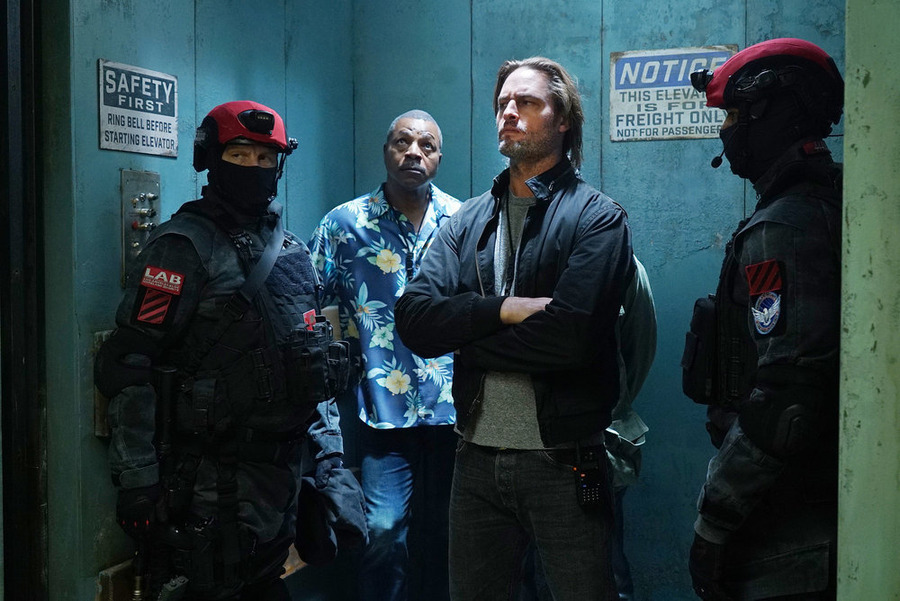
COLONY — “Blindspot” Episode 104 — Pictured: (l-r) Carl Weathers as Beau, Josh Holloway as Will Bowman — (Photo by: Danny Feld/USA Network)
And you’re really going to see the narratives crash together in this single line that tells Will and Katie’s stories in this opposing line of the conflict in a big way that’ll take us to I think a satisfying end point at the end of the season that hopefully nobody will see coming that really upends the show in a big way and sets the stage for season two in such a way where well, I know what this world is but I don’t really know where it’s going to come back next year but I know it’s going to be in a different place and that’s the hope.
Operator: Thank you. Our next question is a follow up from Courtney Vaudreuil with OfSoGray. Please go ahead.
Courtney Vaudreuil: Hi. Can you preview any guests or cast additions coming up for this season that we can look forward to?
Ryan Condal: Yes. We’re very excited about – most of our guest cast has been introduced, but in the latter third of the season we will introduce a couple of new characters that play on more of the resistance side of the equation. One of whom is Thora Birch, the tremendous and talented Thora Birch of American Beauty and Ghost World fame, who is just an absolutely wonderful actor, a terrific person, and a great get for us on Colony. And we’re very excited to introduce her character, Morgan, to the show and have everybody find out, you know, see into a little bit of a different corner of the world.
Operator: Thank you. Our next question is also a follow up, from the line of Michael Simpson with SciFiNow. Please go ahead.
Michael Simpson: Hi again, Ryan. A couple of questions if I may. First of all, what were your main sort of science fiction inspirations growing up and leading into becoming a writer of sci-fi TV shows? And the follow up question would be why do you think it is that science fiction seems to be enjoying something of a resurgence on television?
Ryan Condal: Yes, thank you. I was very inspired by sci-fi growing up, I think more movies than literature. I think I found the literature a little bit later in life. I mean, I was always reading but I think strictly with science fiction it was the movies that drew me in, just because of the really immersive visual world. Stories like Alien and Terminator were definitely and Aliens and Terminator Two were huge influences on me — anything really by James Cameron I would consider as a major influence on me.
And then, you know, something that’s become really my favorite film, you know, later in life because I was able to wrap my head around it a little bit more was Blade Runner. And I just – that’s a movie that I just revisit once a year and just really fascinated by it and it’s the kind of thing that rewards multiple viewings. And I always take something new away from it. I think it’s just this beautifully told and visualized world that centered around this amazing human question, which is what does it mean to be alive and what does it mean to be real. And that is pure science fiction to me, and I love it.
Literature-wise, I think Dune was probably the big one for me. I mean, my dad was a huge Dune fan growing up and passed that love onto me and I’ve read that book countless times. I’m just obsessed with it. So I’ve always really liked those things.
Look, I mean, I’m – you know, the sci-fi renaissance that we’re in, I’m really enjoying. And as a creator, it means that the genre is more palatable and more mainstream than it ever was before, which I think is a great thing for fans, for storytelling, just for TV viewing in general, because we live in a time where you can visualize pretty much anything — even on a television budget, and that means that these wonderful genre stories are being told that mean that you can explore stories, you know, like Blade Runner without – in a context that makes it interesting and absorbing to the audience because you’ve created a world and there’s this visual palate that you can draw from.
And with Colony, you know, it’s like probably no one wants to make a show about Parisians living under Nazi occupation in Paris. I mean, it’s not really practical for the US market. I mean sure, maybe a procedure show someone on like Netflix or HBO. But retelling that story of occupation and colonization in a sci-fi context in modern day Los Angeles with walls and drones, that makes it palatable and interesting to buyers and to audiences and lets us explore similar themes in a kind of brand new world.
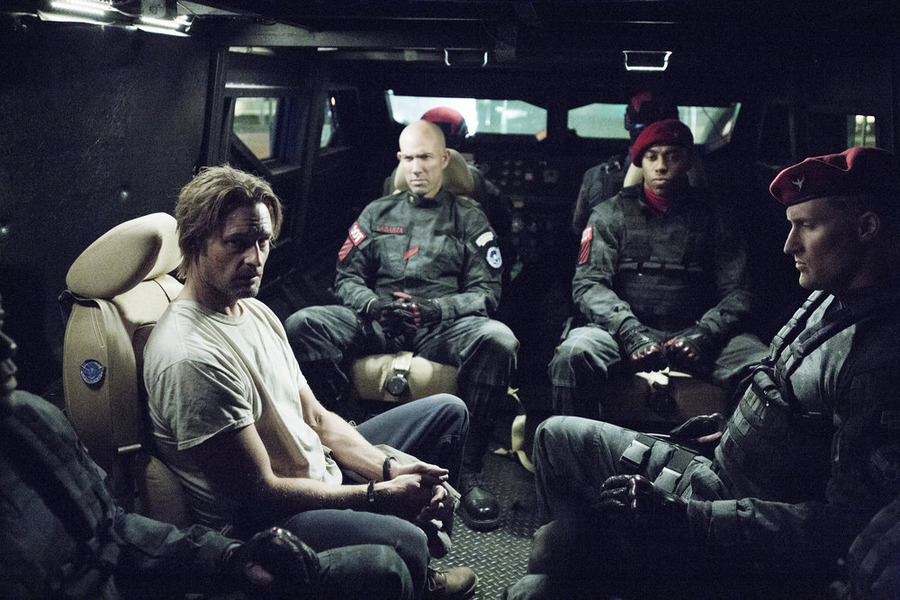
COLONY — “Pilot” Episode 101 — Pictured: Josh Holloway as Will Bowman — (Photo by: Isabella Vosmikova/USA Network)
Operator: Thank you. Our next question is also a follow up from the line of Erin Conrad with ThreeIfBySpace. Please go ahead.
Erin Conrad: Hi again, Ryan.
Ryan Condal: Hi, Erin
Erin Conrad: Hi, I have a 20-year-old son who would like to be you. He is working his way – he’s a freshman in college with the idea that he would like to be a screenwriter, you know, of some sort. And we run across a lot of people, whether they’re, you know, 16, 18, 20, 35, or in my case 56 who would like to write and kind of get their stuff out there. Any advice or any suggestions of where people should go, what they should be looking for, what they should be doing to work toward that kind of a job?
Ryan Condal: Yes, I mean, you know, I think the sort of simple but frustrating answer is that you just have to write. I mean, its pursuit that – there’s a lot of – you know, I started, I think I wrote my first screenplay when I was 20 of my first future, so I started right at your son’s age. But it took me eight years before anybody cared, and it was eight years of a lot of writing along the way and I really just applied myself to it.
And having a business background helped because I had a good day job and I worked in marketing and advertising and I was able to kind of be Bruce Wayne — advertising executive during the day and Batman screenwriter at night. And it really helped me work and live and commit myself to the long term plan, which is this is going to take a long time and I’m going to need to write a lot of screenplays for free that nobody is going to care about or read or even like at the beginning. But all of that will pay off as I get more experience and kind of find my voice and find my way. And you know, eventually I moved to LA. But when I did, before I ever went on the representation search or anything like that, I’d written a lot of screenplays. And I was really experienced.
And I think the best advice that I can give is that like it doesn’t matter who you are or where you’re from, what language you speak, what color you are, what sex you are, if you write a great screenplay in either features or in television, people will read it, people will want it, and people will want to hire you. And that’s what you should dedicate yourself to is becoming a great craftsman. And that means putting in the 10,000 hours, you know, as often Malcolm Gladwell would tell us. And then everything else will, you know, if it’s meant to be and if you have it in you and it’s in your bones, you know, the rest will follow.
Operator: Thank you. Our next…
Ryan Condal: Can we do maybe last question? I have a writer meeting that I have to run off to. Is that possible?
Operator: Of course.
Ryan Condal: Thank you.
Operator: Our last question comes from the line of Tanya Gonzales with Talk Nerdy with Us. Please go ahead.
Tanya Gonzales: Hello again, Ryan.
Ryan Condal: Hi, Tanya.
Tanya Gonzales: In the second episode, we saw Carlos getting sent to the factory. Will we see Carlos again, and will we learn more about what the factory is or does?
Ryan Condal: I will say stay tuned. I think fans who are asking those two questions will be satisfied in some way before the end of the season.
Tanya Gonzales: Thank you very much.
Ryan Condal: Thank you. Thank you everybody. This was great fun. Thanks for covering the show and being interested. I really appreciate it. Take care.
Operator: Ladies and gentlemen, that does conclude the conference call for today. We thank you for your participation and ask that you please disconnect your line.
END

